Today, many carpenters are realizing the importance of having a well-designed website to showcase recent projects, promote services, and connect with potential clients. A strong online presence not only helps build trust but also makes it easier for customers to hire the right expert for their house or commercial job. In this guide, we’ll explore the top carpenter websites to take inspiration from and the key elements that make them successful.
What Makes a Great Carpenter Website?
A well-crafted carpenter website goes beyond just listing services, it showcases skill, creativity, and trustworthiness to attract potential customers. Here are the key elements that make a carpentry project website stand out:

High-Quality Photography of Projects
Clear, professional images of your woodwork, furniture, and interiors instantly convey craftsmanship. A well-organized collection of before-and-after shots, detailed close-ups, and styled room setups helps potential customers visualize the benefits of working with you. Photography should be the center of your website, reflecting both elegance and practicality.
Easy Navigation and Layout
A great user experience is all about simplicity. Clean menus, structured service pages, and intuitive project galleries make it easy for visitors to navigate without confusion. Smart use of white space makes the design feel uncluttered and minimalist, while guiding the eye toward prominent call-to-action buttons such as “Request an Estimate” or “View Portfolio.”
Strong Branding and Storytelling
Consistent use of your logo, brand colors, and design tone builds recognition and trust. A personal story, how you started, why craftsmanship matters, or what makes your carpentry services unique, creates an emotional connection. This storytelling approach can turn casual browsers into committed clients.
Portfolio and Testimonials
Your portfolio is proof of your expertise. Display each carpentry project with photos, short descriptions, and client feedback. Adding testimonials reinforces credibility and allows potential customers to see the real-world benefits of your work. This section should be prominent on the homepage and easy to scroll through.
Local SEO Focus
Carpenters often depend on local work, so visibility in search engines is key. Highlight service areas, embed a Google Map, and display contact details clearly. Optimized SEO ensures your site appears when potential customers search for carpentry services nearby, giving you a competitive edge.
eCommerce Functionality
If you sell custom wood products, accessories, or services, an integrated eCommerce section can expand your reach. Make the online store simple to navigate, with categories, pricing, and “Get an Estimate” options. A minimalist yet professional design here adds both ease and elegance to the shopping experience.
Mobile-Friendly and SEO Optimized
Since most users scroll websites on mobile devices, responsiveness is critical. A mobile-friendly design, fast loading speed, and SEO-optimized content ensure your website is visible and accessible to all potential customers.
Take Your Carpentry Business Online!
Our website development team specializes in creating stunning, client-winning carpenter websites.
Top Carpenter Websites to Take Inspiration From
If you’re planning a carpentry website or looking for design inspiration, these real-world examples show how independent carpenters and established carpentry businesses craft online experiences that attract potential customers.
Woodworking by Design
This carpentry business puts a heavy emphasis on portfolio-driven storytelling. Each carpentry project is documented with detailed case studies, showing the before-and-after process, materials used, and the end results. This collection of projects acts as a living showcase of their capabilities.
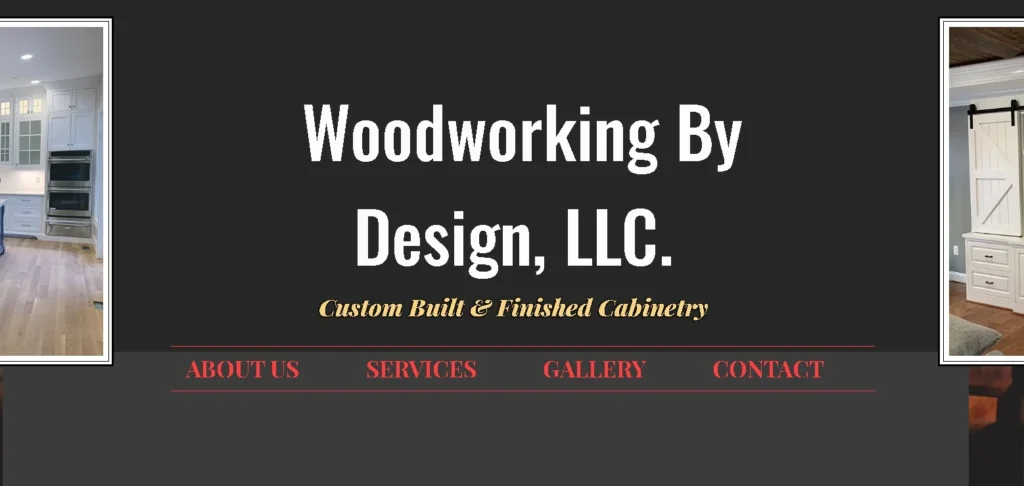
What stands out is their excellent use of customer testimonials and reviews, which are displayed prominently throughout the site.
These real voices from past clients build trust with potential customers and show the tangible benefits of hiring them. The design itself is elegant, easy to scroll, and avoids distractions, keeping the user focused on proof of quality.
Takeaway: Case studies combined with testimonials create credibility and position the brand as trustworthy.
Fine Line Carpentry
Fine Line Carpentry’s website strikes a balance between rustic aesthetics and modern design. Its branding is consistent, with earthy tones and textured visuals that reflect the woodworking craft, paired with clean typography that feels contemporary.
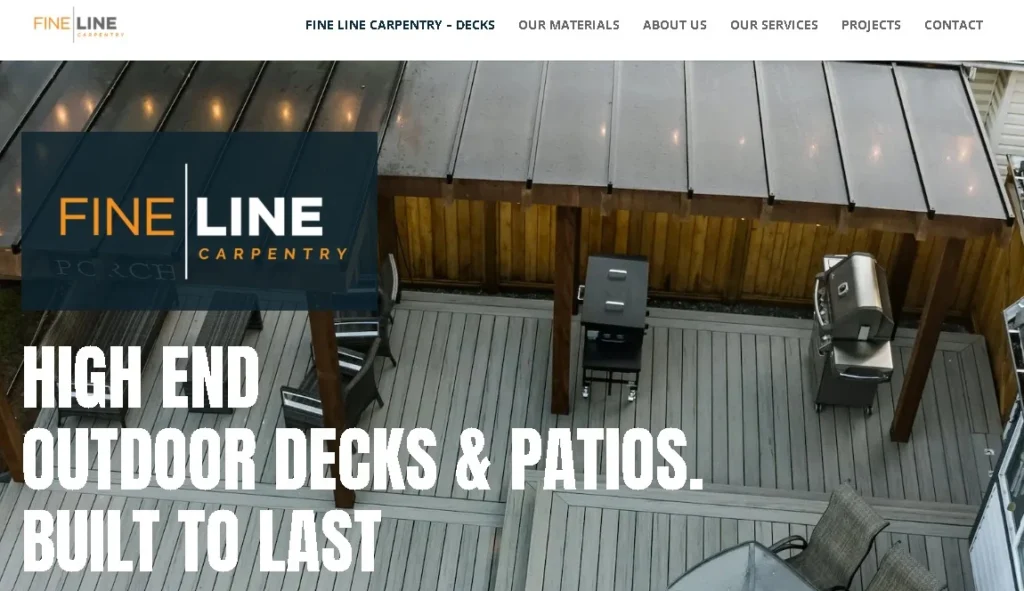
The site provides clear service descriptions for both residential and commercial carpentry. This clarity helps potential customers quickly understand whether Fine Line Carpentry can handle their project. Local service areas are also mentioned, making it easier for clients to connect.
Takeaway: Blending rustic design with modern branding plus location-based messaging makes this site memorable and customer-focused.
The Wood Whisperer (Carpentry + Woodworking)
Unlike many carpenter websites, The Wood Whisperer goes beyond just promoting services, it doubles as a content hub for woodworking enthusiasts. The site includes blog posts, tutorial videos, forums, and downloadable guides, all centered on carpentry and woodworking.
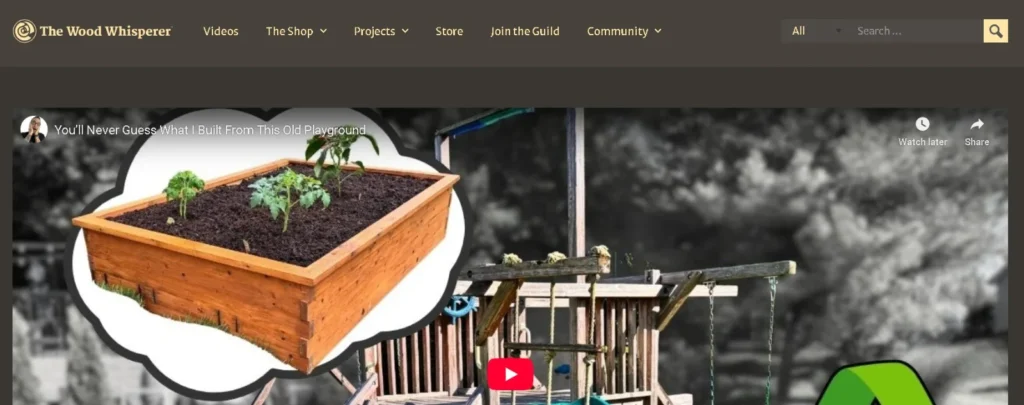
This combination of educational content + services allows the site to attract a broader audience. Even visitors not ready to hire might engage with the content, subscribe to the newsletter, or join the community. For potential customers, this educational authority reassures them that they’re dealing with an expert.
Takeaway: Educational content builds long-term authority, drives traffic, and keeps visitors engaged beyond just service inquiries.
Vorrath Woodworks
Vorrath Woodworks uses stunning, high-resolution photography to capture the artistry of custom carpentry and wood furniture. The homepage immediately draws visitors in with large hero images that exude elegance and craftsmanship.
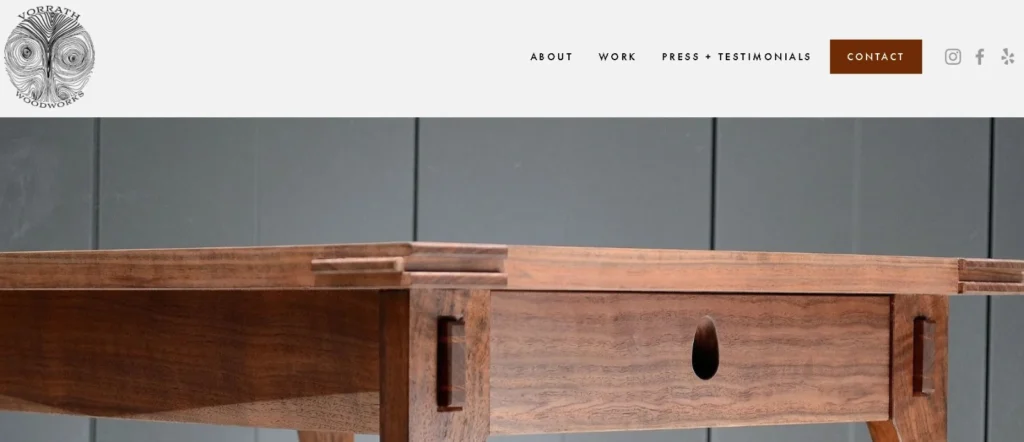
Their About page is another standout feature. Instead of being a generic bio, it tells the brand’s story, philosophy, and passion for woodworking in a way that connects emotionally with potential customers. This strong personal branding makes the company more relatable and trustworthy.
Takeaway: Visual storytelling combined with a strong brand narrative transforms a simple portfolio into an engaging digital experience.
Massachusetts Woodworks
As a more traditional carpentry business, Massachusetts Woodworks combines classic branding with modern web design. The layout is straightforward, but it includes all the right features for a local service-based business.
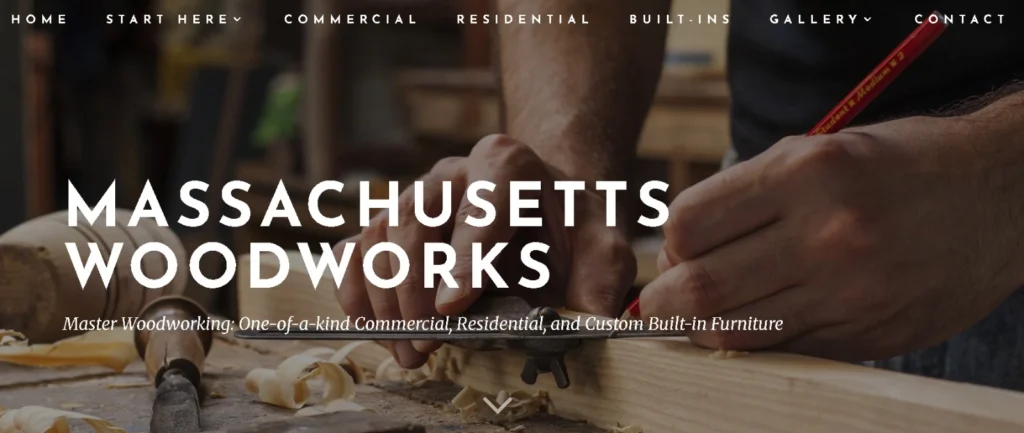
Prominent contact information, integrated Google Maps, and clear calls-to-action like “Request an Estimate” make it easy for potential customers to take the next step. Local SEO elements, such as service areas, customer reviews, and project highlights, are integrated naturally into the site, helping it rank better in regional searches.
Takeaway: For local carpenters, emphasizing SEO, maps, and easy-to-find contact details directly translates into more qualified leads.
Key Takeaways from These Carpenter Websites
Here are some key takeaways:
Invest in Professional Images
High-quality photography is the single most effective way to showcase craftsmanship. Potential customers want to see the collection of your carpentry projects before deciding to reach out.
Professional photos capture the texture, detail, and elegance of woodwork in ways stock images cannot. Make these images prominent on your homepage and portfolio pages, and use them strategically across the site to hold visitor attention.
Portfolio + Testimonials Build Client Trust
A portfolio is your visual résumé. Highlight each carpentry project with descriptions, materials used, and the finished look. Pairing this with testimonials gives proof of quality and reliability. When potential customers scroll through case studies and read reviews, they connect the visuals with real experiences, making them more confident in requesting an estimate.
Educational Content (Blogs, Tutorials) Increases SEO Visibility
Websites like The Wood Whisperer show the benefits of going beyond services. Adding a blog with woodworking tips, tutorials, or behind-the-scenes stories positions you as an authority. Search engines reward websites with fresh, informative content, which means more organic traffic from people searching for carpentry advice or carpentry services.
Clean Design + Easy Navigation Keep Visitors Engaged
Cluttered websites drive visitors away. A minimalist design with thoughtful white space makes the content easy to digest. Menus should be simple, allowing users to navigate quickly to Services, Portfolio, and Contact pages. Clear calls-to-action such as “Request an Estimate” or “See Our Work” should be placed at the center of attention without being distracting.
Local SEO and Mobile Responsiveness Bring in Qualified Leads
For carpenters, local SEO is a must. Optimizing for terms like “carpentry services near me” or “[your city] carpenter” ensures your website reaches people ready to hire. Including Google Maps, location-specific service pages, and local testimonials increases visibility.
Pair this with a mobile-friendly design, since most people scroll on phones, and you’ll attract more qualified leads who can contact you instantly.
Learn: Local SEO Best Practices
How to Build Your Own Carpenter Website?
Here’s how to build your own carpenter website:
Pick the Right Platform (WordPress, Wix, Squarespace, Shopify if Selling)
The foundation of your website matters. WordPress is ideal for flexibility and SEO optimization, while Wix and Squarespace offer beginner-friendly drag-and-drop designs.
If your carpentry business sells custom furniture or wood products, Shopify may be the better choice since it’s built for eCommerce. Choosing the right platform ensures scalability as your carpentry business grows.
Use Carpenter/Carpentry Website Templates for Fast Setup
Most platforms provide pre-built templates designed for trade businesses. A carpenter website template gives you a quick start with layouts tailored for project galleries, services, and contact forms. From there, you can customize branding, colors, and typography to reflect the elegance and personality of your carpentry business.
Add Project Galleries, Reviews, Contact Forms, CTAs
Your website should be more than an online brochure, it’s a lead-generation tool. A project gallery shows off your carpentry projects in a way that’s easy to scroll and browse.
Customer reviews and testimonials act as trust signals. Contact forms and clear CTAs like “Request an Estimate” or “Book a Consultation” ensure potential customers can reach out without friction. These elements should be prominent across your site.
Optimize for SEO (Keywords: Carpentry Services, Local Carpenter Near Me)
SEO is what makes your website discoverable. Use relevant keywords in titles, meta descriptions, and service pages. Create pages targeting both general carpentry services and location-specific searches, such as “Boston carpentry services” or “local carpenter near me.” SEO not only brings in traffic but also ensures your site reaches people searching with intent to hire.
Conclusion
In today’s digital-first world, having a professional website is no longer optional for carpenters, it’s essential. A well-designed site acts as your digital showroom, showcasing your carpentry projects, building trust with potential customers, and generating qualified leads for your business.
The examples above, from minimalist portfolios to content-rich platforms, demonstrate that there’s no one-size-fits-all approach. Each carpenter website uses design, storytelling, and SEO strategies in unique ways to attract and convert clients.
By following best practices such as investing in high-quality photography, optimizing for local SEO, creating engaging content, and ensuring your site is mobile-friendly, you can create a carpentry website that truly stands out.
FAQs About Carpenter Websites
Why do carpenters need a website?
A website serves as the center of your online presence, showcasing your skills and carpentry projects to a wider audience. It not only validates your credibility but also makes it easier for potential customers to request an estimate, view your past work, and find your services through local searches. Without a website, carpenters risk missing out on a significant share of clients who start their search online.
Do carpentry websites need SEO?
Absolutely. SEO ensures your site appears in search results when potential customers look for services like “custom furniture builder” or “local carpenter near me.” Local SEO is especially important, as most carpentry clients come from nearby areas. Optimizing page titles, meta descriptions, and content while ensuring fast site speed and mobile-friendliness can dramatically increase visibility and leads.
How can carpenters attract more clients online?
To bring in more clients, carpenters should focus on:
- Collecting and showcasing testimonials to highlight the benefits of working with you.
- SEO optimization (targeting keywords like “carpentry services” or “local carpenter near me”).
- Adding educational content such as blogs, tutorials, or woodworking tips to boost traffic.
- Leveraging social media marketing with links back to the website.
- Ensuring a minimalist, clean design so visitors can easily navigate and scroll through services.
What should a carpenter include on their website?
Key elements of a carpenter website include:
- Optional eCommerce functionality if you sell wood products or accessories.
- A portfolio or gallery of completed carpentry projects.
- Customer testimonials and reviews for building trust.
- A clear services page with descriptions of offerings.
- Contact forms and CTAs (e.g., “Request an Estimate”).
- Local SEO features such as maps, location-based keywords, and phone numbers.



